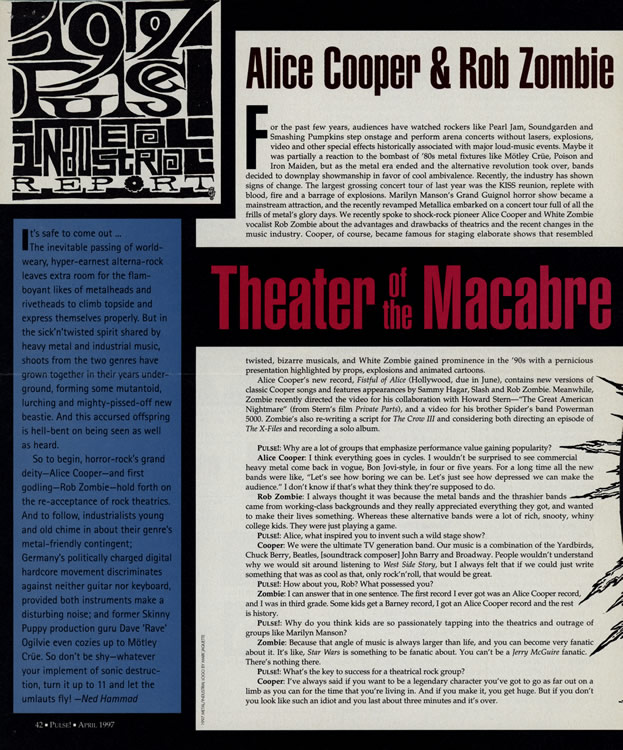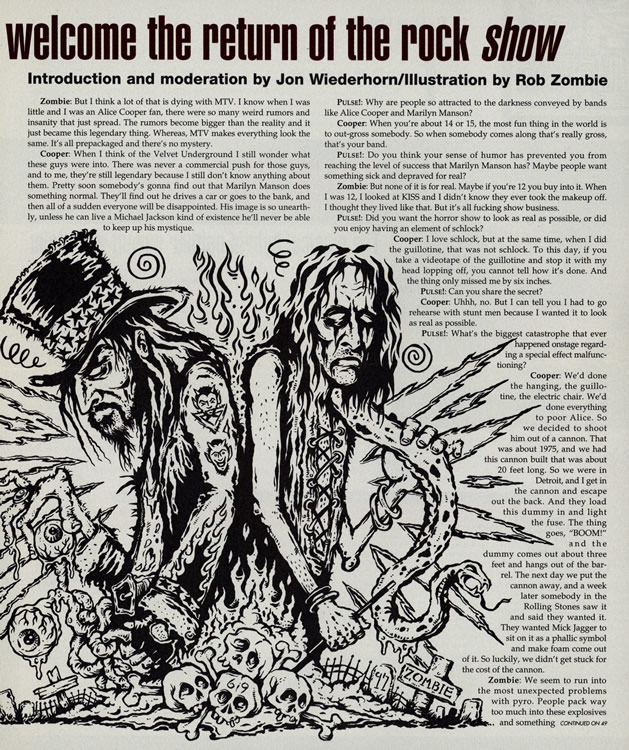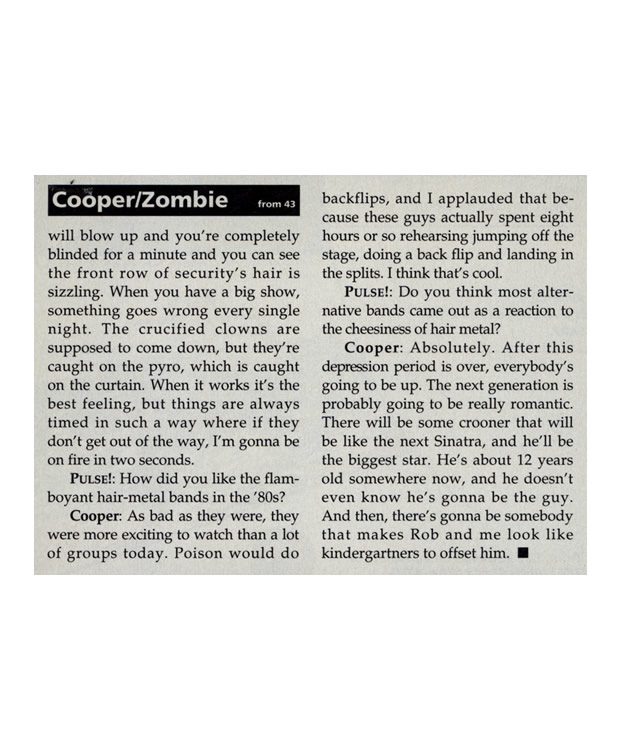Article Database
Theater of the Macabre
Alice Cooper & Rob Zombie
It’s safe to come out… The inevitable passing of world-weary, hyper-earnest alterna-rock leave extra room for the flamboyant likes of metalheads and rivetheads to climb topside and express themselves properly. But in the sick ’n’ twisted spirit shared by heavy metal and industrial music, shoots from the two genres have grown together in their years underground, forming some mutantoid, lurching and mighty-pissed-off new beastie. And this accursed offspring is hell-bent on being seen as well as heard.
So to begin, horror-rock’s grand deity — Alice Cooper — and first godling — Rob Zombie — hold forth on the re-acceptance of rock theatrics. And to follow, industrialists young and old chime in about their genre’s metal-friendly contingent; Germany’s politically charged digital hardcore movement discriminates against neither guitar nor keyboard, provided both instruments make a disturbing noise; and former Skinny Puppy production guru Dave ‘Rave’ Ogilvie even cozies up to Motley Crue. So don’t be shy — whatever your implement of sonic destruction, turn it up to 11 and let the umlauts fly!
For the past few years, audiences have watched rockers like Pearl Jam, Soundgarden and Smashing Pumpkins step onstage and perform arena concerts without lasers, explosions, video and other special effects historically associated with major loud-music events. Maybe it was partially a reaction to the bombast of '80s metal fixtures like Motley Crue, Poison and Iron Maiden, but as the metal era ended and the alternative revolution took over, bands decided to downplay showmanship in favor of cool ambivalence. Recently, the industry has shown signs of change. The largest grossing concert tour of last year was the Kiss reunion, replete with blood, fire and a barrage of explosions. Marilyn Manson's Grand Guignol horror show became a mainstream attraction, and the recently revamped Metallica embarked on a concert tour full of all the frills of metal's glory days. We recently spoke to shock-rock pioneer Alice Cooper and White Zombie vocalist Rob Zombie about the advantages and drawbacks of theatrics and the recent changes in the music industry. Cooper, of course, became famous for staging elaborate shows that resembled twisted, bizarre musicals, and White Zombie gained prominence in the '90s with a pernicious presentation highlighted by props, explosions and animated cartoons.
Alice Cooper's new record, Fistful of Alice (Hollywood, due in June), contains new versions of classic Cooper songs and features appearances by Sammy Hagor, Slash and Rob Zombie. Meanwhile, Zombie recently directed the video for his collaboration with Howard Stern - "The Great American Nightmare" (from Stern's film Private Parts), and a video for his brother Spider's band Powerman 5000. Zombie's also re-writing a script for The Crow III and considering both directing an episode of The X-Files and recording a solo album.
PULSE!: Why are a lot of groups that emphasize performance value gaining popularity?
Alice Cooper: I think everything goes in cycles. I wouldn't be surprised to see commercial heavy metal come back in vogue, Bon Jovi-style, in four or five years. For a long time all the new bands were like, "Let's see how boring we can be. Let's just see how depressed we can make the audience." I don't know if that's what they think they're supposed to do.
Rob Zombie: I always thought it was because the metal bands and the thrashier bands came from working-class backgrounds and they really appreciated everything they got, and wanted to make their lives something. Whereas these alternative bands were a lot of rich, snooty, whiny college kids. They were just playing a game.
PULSE!: Alice, what inspired you to invent such a wild stage show?
Cooper: We were the ultimate TV generation band. Our music is a combination of the Yardbirds, Chuck Berry, Beatles, [soundtrack composer] John Barry and Broadway. People wouldn't understand why we would sit around listening to West Side Story, but I always felt that if we could just write something that was as cool as that, only rock 'n' roll, that would be great.
PULSE!: How about you, Rob? What possessed you?
Zombie: I can answer that in one sentence. The first record I ever got was an Alice Cooper record, and I was in third grade. Some kids get a Barney record, I got an Alice Cooper record and the rest is history.
PULSE!: Why do you think kids are so passionately tapping into the theatrics and outrage of groups like Marilyn Manson?
Zombie: Because that angle of music is always larger than life, and you can become very fanatic about it. It's like, Star Wars is something to be fanatic about. You can't be a Jerry McGuire fanatic. There's nothing there.
PULSE!: What's the key to success for a theatrical group?
Cooper:I've always said if you want to be a legendary character you've got to go as far out on a limb as you can for the time that you're living in. And if you make it, you get huge. But if you don't you look like such an idiot and you last about three minutes and it's over.
Zombie: But I think a lot of that is dying with MTV. I know when I was little and I was an Alice Cooper fan, there were so many weird rumors and insanity that just spread. The rumors become bigger than the reality and it just became this legendary thing. Whereas, MTV makes everything look the same. It's all prepackaged and there's no mystery.
Cooper: When I think of the Velvet Underground I still wonder what these guys were into. There was never a commercial push for those guys, and to me, they're still legendary because I still don't know anything about them. Pretty soon somebody's gonna find out that Marilyn Manson does something normal. They'll find out he drives a car or goes to the bank, and then all of a sudden everyone will be disappointed. His image is so unearthly, unless he can live a Michael Jackson kind of existence he'll never be able to keep up his mystique.
PULSE!: Why are people so attracted to the darkness conveyed by bands like Alice Cooper and Marilyn Manson?
Cooper: When you're about 14 or 15, the most fun thing in the world is to out-gross somebody. So when somebody comes along that's really gross, that's your band.
PULSE!:Do you think your sense of humor has prevented you from reaching the level of success that Marilyn Manson has? Maybe people want something sick and depraved for real?
Zombie: But none of it is for real. Maybe if you're 12 you buy into it. When I was 12, I looked at KISS and I didn't know they ever took the makeup off. I thought they lived like that. But it's all fucking show business.
PULSE!: Did you want the horror show to look as real as possible, or did you enjoy having an element of schlock?
Cooper: I love schlock, but at the same time, when I did the guillotine, that was not schlock. To this day, if you take a videotape of the guillotine and stop it with my head lopping off, you cannot tell how it's done. And the thing only missed me by six inches.
PULSE!:Can you share the secret?
Cooper: Uhhh, no. But I can tell you I had to go rehearse with stunt men because I wanted it to look as real as possible.
PULSE!: What's the biggest catastrophe that ever happened onstage regarding a special effect malfunctioning?
Cooper: We'd done the hanging, the guillotine, and electric chair. We'd done everything to poor Alice. So we decided to shoot him out of a cannon. That was about 1975, and we had this cannon built that was about 20 feet long. So we were in Detroit, and I get in the cannon and escape out the back. And they load the dummy in and light the fuse. The thing goes, "Boom!" and the dummy comes out about three feet and hangs out the barrel. The next day we put the cannon away, and a week later somebody in the Rolling Stones saw it and said they wanted it. They wanted Mick Jagger to sit on it as a phallic symbol and make foam come out of it. So luckily, we didn't get stuck for the cost of the cannon.
Zombie: We seem to run into the most unexpected problems with pyro. People pack way too much into these explosives and something will blow up and you're completely blinded for a minute and you can see the front row of security's hair is sizzling. When you have a big show, something goes wrong every single night. The crucified clowns are supposed to come down, but they're caught on the pyro, which is caught on the curtain. When it works it's the best feeling, but things are always timed in such a way where if they don't get out of the way, I'm gonna be on fire in two seconds.
PULSE!: How do you like the flamboyant hair-metal bands in the '80s?
Cooper: As bad as they were, there were a lot more exciting to watch than a lot of groups today. Poison would do backflips, and I applauded that because these guys actually spent eight hours or so rehearsing jumping off the stage, doing a back flip and landing in the splits. I think that's cool.
PULSE!: Do you think most alternative bands came out as a reaction to the cheesiness of hair metal?
Cooper: Absolutely. After this depression period, everybody's going to be up. The next generation is probably going to be really romantic. There will be some crooner that will be like the next Sinatra, and he'll be the biggest star. He's about 12 years old somewhere now, and he doesn't even know he's gonna be the guy. And then, there's gonna be somebody that makes Rob and me look like kindergartners to offset him.






